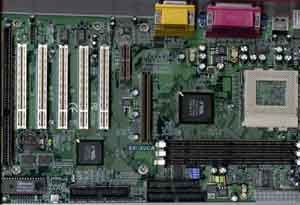EPoX EP-3VCA Apollo Pro 133A Socket-370 ATX
by Anand Lal Shimpi on February 8, 2000 11:26 PM EST- Posted in
- Motherboards
As with most current PC motherboard manufacturers, EPoX was formed back in the late 80's but only in the past few years have their products been brought into the public eye, mainly because of the advent of the Internet as medium for free marketing for those companies that can produce high quality products.
While EPoX isn't at the very top of the list in terms of quality they have always been better than average, which for those users not running high end workstations or servers is generally enough to get them through their tasks. With some fairly decent EPoX motherboards here in the lab, we definitely had some high expectations for their Apollo Pro 133A based motherboard, the 3VCA.
Unfortunately, the Apollo Pro 133A motherboard market is still an infant one. Motherboard manufacturers are still working out the issues involving their implementations of the 133A chipset, and because of this we have seen a number of normally reliable motherboard manufacturers release some very disappointing solutions based on VIA's alluring chipset.
But with the increasing demand for true 133MHz FSB motherboards for use with the extremely overclockable FC-PGA Pentium III chips, some users are growing very desperate in the search for a motherboard with official 133MHz FSB support that is reliable at the same time. In spite of the recent influx of poorly manufactured 133A based motherboards, EPoX seems to have risen to the challenge quite nicely with their 3VCA.
New Anand Tech Report Card Rating 85/B
| CPU Interface |
FC-PGA/PPGA Socket-370
|
| Chipset |
VIA Apollo 133A
VIA 694X North Bridge VIA 686A South Bridge |
| L2 Cache |
N/A (on-chip)
|
| Form Factor |
ATX
|
| Bus Speeds |
66 / 75 / 83
100 / 105 / 110 / 112 / 115 / 120 / 124 133 / 140 / 150 |
| Voltages Supported |
Auto Detect (1.30v - 3.5v)
|
| Memory Slots |
3 168-pin DIMM Slots
|
| Expansion Slots |
1 AMR Slot
1 AGP Slot 5 PCI Slots (3 Full Length) 1 ISA Slot (1 Shared / 1 Full Length) |
| AC'97 |
VIA VT1611A
|
| BIOS |
AWARD BIOS
|
The Good
While we have seen 133A based motherboards that feature a Slot-1 connector combined with a Socket-370 connector (ala Tyan Trinity 400) as well as those with simply a Slot-1 connector, the 3VCA is the first we have seen with solely a Socket-370 interface. The first thing that must be mentioned is that the Socket-370 implementation on the 3VCA is fully pin-compatible with both PPGA Celeron CPUs and FC-PGA Pentium III CPUs. This two way compatibility may not seem like much, but the 3VCA is one of the first motherboards to officially support both CPUs in a Socket-370 interface in the initial shipping revision of the motherboard. The documentation does not specifically state whether the socket is compatible with VIA/Cyrix's upcoming Joshua processor, however it is pretty safe to assume that the board will be compatible with the upcoming CPU.
Making use of a physically smaller (in length) Socket-370 connector, you would expect the 3VCA to be a noticeably smaller motherboard when compared to the Slot-1 133A solutions we've looked at in the past. This isn't the case as EPoX uses the saved space to help clear up some of the clutter normally associated with boards that are this crowded. The board features a somewhat common 5/1/1/1 (PCI/ISA/AMR/AGP) expansion slot configuration provided for by the VIA 686A South Bridge on-board the PCB. The 686A's integrated PCI-to-ISA bridge allows for the single ISA slot to be included without using an external PCI-to-ISA bridge and it's integrated AC'97 controller provides for the low-cost AMR interface. In addition to those two cost saving features, the 686A also provides the native Ultra ATA 66 support of the 3VCA.
As with most 133A based motherboards, the 3VCA features a total of three DIMM slots all of which are capable of accepting up to 256MB DIMMs. Our compatibility tests showed that using double sided 256MB DIMMs that featured 128Mbit SDRAM chips had no problem with the 3VCA, which is something we expected to happen, especially since we weren't dealing with stacked or registered DIMMs.











0 Comments
View All Comments